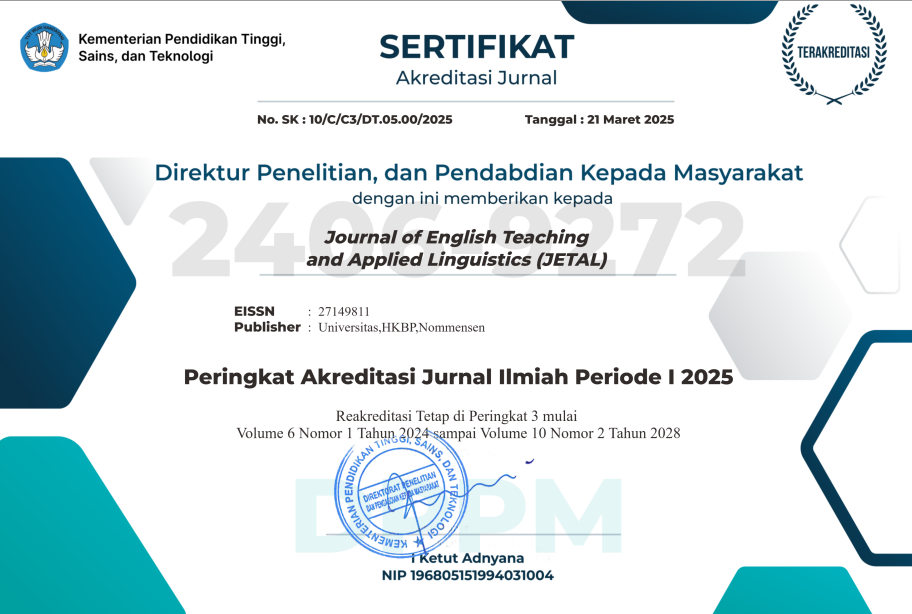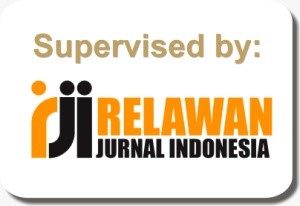The Effects of Wordle Media on Students’ Vocabulary Mastery
Abstract
The incorporation of technology-based media and teaching English vocabulary is considered to be puzzling. Teachers should take into account the students’ learning style and their capabilities in operating the technology-based media. One of the practical technology-based media to teach vocabulary is Wordle. This study attempted to examine the effectiveness of an intervention using Wordle media to improve students’ vocabulary mastery. This study involved 74 students of a private vocational school in Bandung. A quasi experimental research study was employed as the design of research. The findings indicated that implementing Wordle media proves to be effective in enhancing the students’ vocabulary mastery. There is significance differences between experimental and control classes.
References
Alqahtani, M. (2015). The Importance of Vocabulary in Language Learning and How to Be Taught. International Journal of Teaching and Education, 3(3), 21-34.
Arndt, H. L., & Woore. R. (2018).Vocabulary learning from watching YouTube videos and reading blog posts. Language Learning & Technology, 22(1), 124–142. Retrieved from https://doi.org/10125/44660
Baumann, J. F., Kame’enui, E. J., & Ash, G. E. (2003). Research on Vocabulary Instruction: Voltaire Redux. Handbook of research on teaching the English language arts, 2, 752-785.
Berne, J.I., & Blachowicz, C.L.Z. (2008). What Reading Teachers Say about Vocabulary Instruction: Voice from the Classroom. The Reading Teacher, 62(4), 314-323.
Chiang, H., H. (2019). A Comparison between Teacher-Led and Online Text-to-Speech Dictation for Students’ Vocabulary Performance. English Language Teaching; 12 (3). 77-93.
Eren. M. (2015). Vocabulary learning on learner-created content by using web 2.0 tools. Contemporary Educational Technology, 5(4), 281-300.
Garris, R., Ahlers, R., & Driskell, J. E. (2002). Games, Motivation, and Learning: A Research and Practice Model. Simulation & Gaming, 33(4), 441–467. Retrieved from https://doi.org/10.1177/1046878102238607
Hussain, Z. (2018). The effects of ICT-based learning on students’ vocabulary mastery in junior high schools in Bandung. International Journal of Education, 10(2), 149-156. doi: http://dx.doi.org/10.17509/ije.v10i2.7592
Khan, M.S., Khan, I., U-Din, S., & Jan, R. (2015). The impacts of ICT on the students’ Performance: A Review of Access to Information. Research on Humanities and Social Sciences, 5(1), 85-94.
Khany, R. & Khosravian, F. (2014). Iranian EFL learners' vocabulary development through Wikipedia. English Language teaching, 7(7). 57-67.
Khazaei, S., Dastjerdi, H.V. (2011). An Investigation into the Impact of Traditional vs. Blended Teaching on EFL Learners’ Vocabulary Acquisition: M-learning in Focus. International Journal of Humanities and Social Science, 1(15), 202-207
Letchumanan, K., Tan, B. H., Paramasivam, S., Sabariah, M. R., & Muthusamy, P. (2015). Incidental Learning of Vocabulary through Computer-Based and Paper-Based Games by Secondary School ESL Learners. Pertanika Journal of Social Sciences & Humanities, 23(3), 725–740.
Li, J., & Cummins, J. (2019). Effect of using texting on vocabulary instruction for English learners. Language Learning & Technology, 23(2), 43–64. Retrieved from https://doi.org/10125/44682
Pazio, M. (2010). Blended learning and its potential in expanding vocabulary knowledge: A case study. Teaching English with Technology, 10(1) 3-30.
Rabu, S. N. A., & Talib, Z. (2017). The Effects of Digital Game-based Learning on Primary School Students’ English Vocabulary Achievement and Acceptance. Innovative Teaching and Learning Journal, 1 (1), 61–74.
Ramezanali, N., & Faez, F. (2019). Vocabulary learning and retention through multimedia glossing. Language Learning & Technology, 23(2), 105–124. Retrieved from https://doi.org/10125/44685
Sadikin. I.S. (2016). The use of web quest for teaching English vocabulary in an EFL young learner context. ICTTE, 1(1), 403-410.
Schmidt, E. & Hegelheimer, V. (2004). Effects of Online Academic Lectures on ESL Listening Comprehension, Incidental Vocabulary Acquisition, and Strategy Use. Computer Assisted Language Learning 17(5), 525–564.
Scurletis, G. (2009). Marzano’s six steps to effective Vocabulary instruction, VISUAL THESAURUS; workshop vocab activities for your classroom. Retrieved from https://www.visualthesaurus.com/cm/wordshop/marzanos-six-steps-to-effective-vocabulary-instruction/
Tafazoli, D. (2013). Wordling: Using Word Clouds in Teaching English Language. The Journal of Instructional Technology and Distance Learning, 10(8), 53-58.
Tuttle, H.N. (2005). Human life is radical reality: An idea developed from the conceptions of Dilthey, Heidegger, and Ortega y Gasset. Peter Lang Publishing: New York.
Young, S. S. C., & Wang, Y. H. (2014). The game embedded CALL system to facilitate English vocabulary acquisition and pronunciation. Educational Technology and Society, 17(3), 239–251.
Authors retain copyright and grant the journal right of first publication with the work simultaneously licensed under a Creative Commons Attribution-ShareAlike 4.0 International License (CC BY-SA 4.0) that allows others to share the work with an acknowledgment of the work's authorship and initial publication in this journal.
Authors are able to enter into separate, additional contractual arrangements for the non-exclusive distribution of the journal's published version of the work (e.g., post it to an institutional repository or publish it in a book), with an acknowledgment of its initial publication in this journal.
Authors are permitted and encouraged to post their work online (e.g., in institutional repositories or on their website) prior to and during the submission process, as it can lead to productive exchanges, as well as earlier and greater citation of published work (See The Effect of Open Access).






